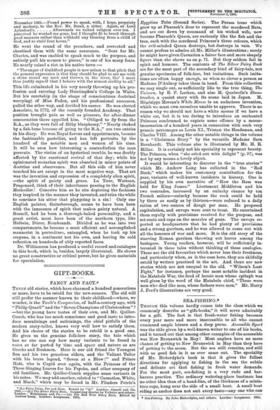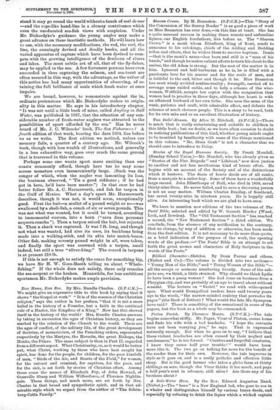SEA-FISHING.*
THOUGH this volume hardly comes into the class which we commonly describe as " gift-books," it will serve admirably for a gift. The fact is that fresh-water fishing becomes every year more and more inaccessible to all who cannot command ample leisure and a deep purse. Accessible Sport was the title given by a well-known writer to one of his books, and it turned out that among other examples of the accessible was New Brunswick in May! Most anglers have no more chance of getting to New Brunswick in May than they have of getting to the moon. But the sea still remains, and still with as good fish in it as ever came out. The speciality of Mr. Bickerdyke's book is that it gives the fullest directions for applying to fishing in the sea the subtle and delicate art that fishing in fresh water demands. For the most part, sea-fishing is a very rude and bar- barous practice. The ordinary watering-place boatman has no other idea than of a hand-line, of the thickness of a minia- ture rope, hung over the side of a small boat. A small boat riding at anchor does not suit every taste—any one who can
• Sso•Fishing. By John Bickerdyke, and others. London: Long:mans. 1895.
stand it may go round the world without a touch of mal de Inv —and the rope-like hand-line is a clumsy contrivance which
even the uneducated sea-fish views with suspicion. Under Mr. Bickerdyke's guidance the young angler may make a great advance on these inartistic methods. He will learn how to use, with the necessary modifications, the rod, the reel, the
line, the cunningly devised and deadly hooks, and all the varied apparatus of capture which have been devised to com-
pete with the growing intelligence of the denizens of rivers and lakes. The most subtle art of all, that of the fly-fisher, may be applied to the sea. A few fortunate persons have even succeeded in thus capturing the salmon, and sea-trout are often secured in this way, with the advantage, as the writer of this notice has had many opportunities of observing, of re- taining the full brilliance of scale which fresh water at once impairs.
We are bound, however, to remonstrate against the in_ ordinate pretensions which Mr. Bickerdyke makes to origin.
ality in this matter. He says in his introductory chapter,
"It was not until a little book of mine, called Angling in Salt Water, was published in 1887, that the attention of any con-
siderable number of fresh-water anglers was attracted to the
possibilities of sport afforded by the sea." Has he never heard of Mr. J. C. Wilcocks' book, The Sea Fisherman ? A fourth edition of that work, bearing the date 1884, lies before us as we write. The first edition we noticed, unless our
memory fails, a quarter of a century ago. Mr. Wilcock's book, though with less wealth of illustrations, and generally in a less exhaustive way, goes over much the same ground that is traversed in this volume.
Perhaps some one wants sport more exciting than our coasts commonly afford, though here too he may come across monsters even inconveniently large. (Such was the conger of which, when the angler was lamenting its loss, the boatman observed, " 'Tis a good riddance ; if he had got in here, he'd have been master.") In that case he had better follow Mr. A. C. Harmsworth, and fish for tarpon in the Gulf of Mexico. What a day's sport Mr. Harmsworth describes, though it was not, it would seem, exceptionally good. First the bait—a mullet of a pound weight or so—was swallowed by a shell-fish, a conch of six or seven pounds. This was not what was wanted, but it could be turned, according to immemorial custom, into a. horn (" cava dum personat aequora concha "). Then a tarpon seized the bait, but rejected it. Then a shark was captured. It was 7 ft. long, and though not what was wanted, had also its uses, its backbone being made into a walking-stick, and its akin into match-boxes. Other fish, making seventy pound weight in all, were taken, and finally the sport was crowned with a tarpon, small indeed, but still a true "silver-king." The record in tarpons is at present 210 lb.
If this is not enough to satisfy the craze for something big, we have Sir H. W. Gore-Booth telling us about "Whale- fishing." If the whale does not satisfy, there only remains the sea-serpent or the kraken. Meanwhile, for less ambitions sportsmen Mr. Bickerdyke makes ample provision.



















































 Previous page
Previous page